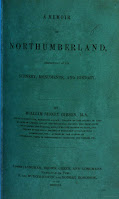This excerpt comes from A Memoir of Northumberland, Descriptive of Its Scenery, Monuments, and History, a book written by William Sidney Gibson, M.A., published in 1860. It is available in its entirety here at Google Books. The description below is on pages 32-33.
. . . Although the pitmen are an unpolished race, and as regards religious and secular instruction have too generally been left as uncultivated as their dialect is uncouth, they share the Northumbrian energy of character, and, where they have acquired any education at all, there are constant examples of their desire for knowledge, especially in applied sciences. Great allowances must be made for this Troglodytean class of labourers, for they spend their youth and vigour cramped in close and impure air in a high temperature, are liable to instant destruction from the 'fire-damp' and equally fatal 'choke-damp' of the mine, and lead a cheerless life which almost separates them from the world of breeze and sunshine. Where libraries have been formed for the colliers . . . upon the Tyne, the men readily avail themselves of such advantages, and it appears that works of imagination are especially in demand. Allotment gardens, too, are becoming very generally cultivated in the collier villages. The wages of the pitmen are good, and sufficient for their wants, and there are a few colliery villages where a school is not maintained besides a reading-room or mechanics' institute. . . . In the coal-mining districts, unfortunately, a boy is no sooner able to earn some wages than he is taken from school; and, as regards benefit societies, the helpless widows and children of coal-miners have still to lament the want of a provident or assurance fund, a provision which the coal-owners ought to assist their labourers in making, for although of late years, from greater care and improved ventilation, there have been fewer of the frightful explosions that used to bring sorrow and destitution to scores of families at once, there is an increase in the number of deaths in coal-pits in proportion to the number of tons of coal now raised. So much for the physical condition of the labouring population.
Observations and Comments
- Can I absolutely trust Gibson's descriptions or were they written from some elevated status and by comparison to his own situation? The adjectives and descriptions seem somewhat demeaning. (I have to remind myself that it was England where there were already classes at different levels of society, and it was 1860.)
- Regarding their "uncouth" dialect, I don't know if the author is referring to accent, manner of speech, choice of words, or something else, or maybe something more. Language is always evolving. Research suggests that the early Northumbrian dialect was not in use in 1860 but there were probably remnants of it. The online magazine, Living North, has an interesting article about the language. And you can listen to a man from Northumberland describing the farmhouse where he grew up here at the British Library. I can't think of the language as "uncouth" but I admit I have to pay very close attention to understand what he's saying. Of course, more than a century separates Gibson's book and this audio recording.
- Perhaps religious and secular instruction were minimal but I have been pleased to see that my ancestors were married in churches and their children christened in them.
- I like the description "energy of character" and to read that they had a desire for knowledge.
- Troglodytean refers to cave-dwellers. While the miners did not dwell in caves the comparison seems somewhat appropriate: both caves and mines are dark and dank. (Or was the author suggesting something else?)
- From census records I see that many of the boys of my ancestral families began working in the mines at 10 or 12 years of age. The description, "they spend their youth and vigour cramped in close and impure air . . . and lead a cheerless life which almost separates them from the world of breeze and sunshine," seems accurate, from what I've learned in my research of coal mining.
- Libraries! Good to know that there were sometimes libraries available.
- Gardening, good wages, schools -- all good (except the boys ending their formal education so early).
- Causes of death, widows and orphans.... I have not yet (and hope I don't) discover a Northumberland mining ancestor who died in a mining accident and left a widow and children. (William Doyle, father of Andrew Doyle, did die from being run over by a cart wheel but I've been unable to determine whether it was in a mine or not. He left his wife, Martha Reay Doyle, pregnant and with five children ages 12 and younger.)
I don't know if there will ever be enough resources to get an accurate view of ancestors' lives, but each additional source gives me a slightly broader glimpse.
-–Nancy.
Copyright © 2022 Nancy Messier. All Rights Reserved.
Do not copy or use any content from this blog without written permission from the owner.
.


The word troglodyte leapt out at me too. I was interested to see it used in this context. It did seem a bit unfair, particularly as they did show an interest in learning. I listened to that recording. The voice was very musical to my ears. Like you I had to really concentrate to hear what was being said but I think it was to do with the speed with which it was being delivered.
ReplyDeleteI wish I knew how people in the 1860s in England defined Troglodyte. Sad if they were using it with our modern definition and connotations.
DeleteOh, yes, definitely a musical voice and language. I'm sure I would learn to easily understand if I heard it frequently.